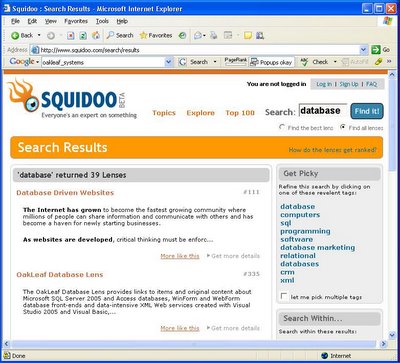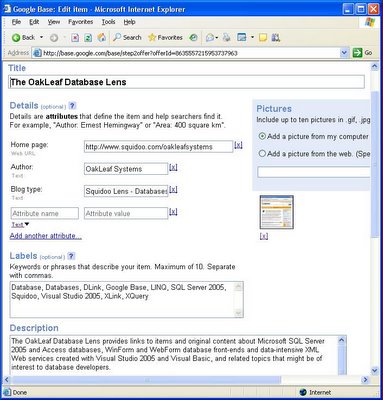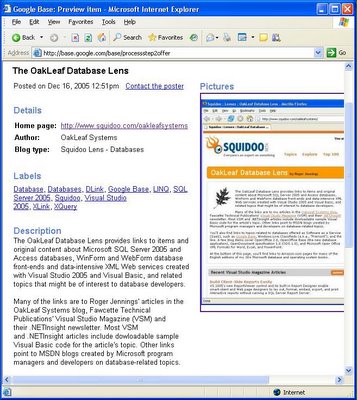Squidoo and Google Base: A Tale of Two Aggregators
"What has been new is information overload. Email long ago became a curse. Blogreaders only exacerbate the problem. ...
"What will be new is people coming together to rate, to review, to discuss, to analyze, and to provide 100,000 Zagat’s, models of trust for information, for goods, and for services. ...
"What will be the big enabler? Will it be Attention.XML as Steve Gillmor and Dave Sifry hope? Or something else less formal and more organic? It doesn’t matter. The currency of reputation and judgment is the answer to the tragedy of the commons and it will find a way. This is where the action will be." Other than the obvious relationship between 23-skidoo—a roaring-twenties slang term for "I'm outta here," which might have originated in the Barney Google comic strip—and the Squidoo moniker, similarities between Squidoo and Google Base aren't readily apparent.
Squidoo and Google Base are in the beta stage, and both aggregate Other People's Content (OPC, a.k.a. unpaid media). Both services store OPC and its search attributes in one or more databases, which makes them fodder for this blog.
Updated December 27, 2005: The Important Beta Bugs section has been moved to the "Squidoo Beta Problems - December 2005" post of December 27, 2005. This update also includes minor revisions for events that occurred after December 20, 2005.
Squidoo represents an attempt to reduce the information overload that's resulted from the exponential growth of Internet content. Squidoo pages (called lenses) let writers share their expertise on a particular topic with readers. As Adam Bosworth, vice-president of Google, stated in his "Collaboration, Customization, and Communication" presentation to the Second International Conference on Service Oriented Computing (ICSOC04):
Other than the obvious relationship between 23-skidoo—a roaring-twenties slang term for "I'm outta here," which might have originated in the Barney Google comic strip—and the Squidoo moniker, similarities between Squidoo and Google Base aren't readily apparent.
Squidoo and Google Base are in the beta stage, and both aggregate Other People's Content (OPC, a.k.a. unpaid media). Both services store OPC and its search attributes in one or more databases, which makes them fodder for this blog.
Updated December 27, 2005: The Important Beta Bugs section has been moved to the "Squidoo Beta Problems - December 2005" post of December 27, 2005. This update also includes minor revisions for events that occurred after December 20, 2005.
Squidoo represents an attempt to reduce the information overload that's resulted from the exponential growth of Internet content. Squidoo pages (called lenses) let writers share their expertise on a particular topic with readers. As Adam Bosworth, vice-president of Google, stated in his "Collaboration, Customization, and Communication" presentation to the Second International Conference on Service Oriented Computing (ICSOC04):
Squidoo lenses are intended to be "models of trust for information." Whether lenses can gain similar stature for goods and services remains to be seen.
Google Base, on the other hand, appears to contribute to information overload by duplicating OPC in what could become the world's largest freely-accessible, Internet-based content database. Google Base's saving grace is the ability to categorize content for more precise searching.
Adding Items to Squidoo vs. Google Base
Squidoo offers hosted Web pages to which self-annointed "experts" can add Modules for free-text entry or that generate links to their blogs, Web sites, Flickr images, books, magazine or online articles, items for sale, and/or geographic location with Google Maps (which needs a minor address input fix as of December 15, 2005, but works OK with a fully validated USPS address.)
A Squidoo module is a special-purpose UI for adding and editing a particular type of data, such as RSS 2.0 or Atom 0.3/1.0 for automating multiple links to blog entries, generating and reorganizing lists of books on Amazon.com, manually adding links to Web pages, and processing Flickr photos. Modules enable Squidoo's developers to quickly add, modify, or delete data types. For example, an inoperative Technorati module disappeared on December 15, 2005 and a new Google Maps module arrived the same day.
 Squidoo has a much more user-friendly item creation and editing UI than Google Base. I was able to build a reasonably complete "Oakleaf Database Lens" with links to about 70 individual items in less than an hour. Automated, direct import of this blog's Atom 0.3 feed and links to my books on Amazon.com streamlined the lens creation process. There appears to be no limit to the number of items you can import; however, lenses are limited to a single page and modules don't appear to have paging options. Thus, the practical limitation on the number of imported items probably is page height.
Squidoo has a much more user-friendly item creation and editing UI than Google Base. I was able to build a reasonably complete "Oakleaf Database Lens" with links to about 70 individual items in less than an hour. Automated, direct import of this blog's Atom 0.3 feed and links to my books on Amazon.com streamlined the lens creation process. There appears to be no limit to the number of items you can import; however, lenses are limited to a single page and modules don't appear to have paging options. Thus, the practical limitation on the number of imported items probably is page height.
Squidoo lacks Google Base's capability to define custom item types, such as taxonomies, and has minimal module customization features. However, Squidoo more than compensates for these limitations by dramatically simplifying the process of bulk-uploading RSS 2.0/Atom 0.3 feeds. Another benefit of aggregating your content with Squidoo is that no Squidoo items self-destruct in 30 days.
 The RSS/Atom Feed module updates automatically at user-defined intervals of 30 minutes to one week. Thus, maintaining a current blog entry list is a no-brainer compared with the bulk-update agony described in my "Google Base and Atom 0.3 Bulk Uploads" and "Bulk-Uploaded Items Disappear from Google Base" posts.
The RSS/Atom Feed module updates automatically at user-defined intervals of 30 minutes to one week. Thus, maintaining a current blog entry list is a no-brainer compared with the bulk-update agony described in my "Google Base and Atom 0.3 Bulk Uploads" and "Bulk-Uploaded Items Disappear from Google Base" posts.
The Long Tail, Aggregators, and Filterers Almost all blogs—including this one—and Web sites are destined for the obscurity of the Long Tail. August Capital's David Hornik concludes in his December 13, 2005 "Where's The Money In The Long Tail?" VentureBlog post: [T]here are essentially two general classes of technology [that] will benefit economically from the Long Tail -- aggregators and filterers." Hornik goes on to analyze the roles of aggregators and filterers:
The aggregators are those web businesses that seek to collect up as much of the Long Tail content as is possible, so as to make their "stores" a one stop shop for content no matter how popular or obscure. ... The value to consumers from these content aggregators is that they need not shop in dozens of places on the web in order to acquire a diverse set of content. As a result, aggregators are able to extract a disproportionate amount of value for the sale of each individual piece of content. And while creators are likely to sell slightly more content as a result of the increased ease of salability, they will not likely emerge from the obscurity of the Tail merely because they are made available for sale on Amazon or iTunes. The filterers are those businesses that make it easier to find the content in which we are interested, despite the increasing proliferation of content creators, hosts, aggregators, etc. The purest form of filterer is the search engine. But the more obscure the content, the less effective the generalized search engine will be. ... Again, while these different filtering technologies may make it slightly more likely that an end user finds his or her way to a piece of obscure content, it will not likely be sufficient to catapult an artist into the mainstream. The beneficiary of the filtering is the end user and the filterer, not the content owner per se.Hornik believes "that it is difficult to be an aggregator without also being a filterer. It will be hard to sustain the scale necessary for an aggregation business if you don't initially also provide some of your own filtering tools."
Filtering by Tagging
Squidoo enables you to assign an arbitrary set of tags to a lens, but not to individual items; Squidoo calls the lens's tag collection a Tag Cloud. As an example, the Oakleaf Database Lens has 30 database-related and a few off-topic tags. Typing database as the tag name in Squidoo's home page and clicking Find It returns a filtered list of lenses that share the tag, as shown here:

You can filter lenses with multiple matching tags by clicking one or more of the Get Picky items, for example sql and xml. You clear the additional filter terms by entering the same or a new key name in the Search text box. (The UI lacks instructions for clearing added search terms.)
Google Base lets you assign custom details name/value attribute pairs and add arbitrary tags to individual items. Searching for individual items by tag name(s) or attribute value(s) enables finer-grained filtering, which is important when filtering large page populations that have popular or broadly scoped tags.
Google is the Internet's most popular and eclectic filtering service, with basic Web page, blog, regional (Google Froogle Local), consumer product (Froogle), video, and (recently) music searches. Google Base intends to automatically assign user-created content to a specific Google filtering property based on its item type. The Google Base Help Center's "Where Will My Item Appear?" topic states:
Thus, Google, not you, will decide where or if your content might appear. My "Google Base and Blogger Items Missing from Google Search" post has more details on these issues. Increase Blog or Site Traffic with Squidoo? Not Likely. Squidoo's FAQ includes these two unsubstantiated bullet points:The type of information in your item will determine which Google property will display it.
For example, any items you're selling will appear on Froogle. Your master's thesis or short story will appear on Google. And your glowing review of the new restaurant down the block would appear on Google Local.
Please note that these are guidelines only. We're unable to make predictions or guarantees about where your content will appear.
• Increase your traffic: Your lens points (if you want it to) to your blog and to your website. In addition, lenses have huge credibility with search engines, so a lens is going to increase the traffic to your website even for people who don't visit your lens. • [You should build a lens if you] have a Web site and you're not happy with your PageRank in Google, a lens will increase it. That's because a lens provides exactly what search engines are looking for: authoritative insight so people can find what they're looking for.Seth Godin—the well-known entrepreneuer and author who founded Squidoo—might have authored the preceding claims, but I've found no evidence whatsoever that "lenses have huge credibiility with search engines" or "a lens provides exactly what search engines are looking for." I've yet to find more than one Skidoo page with a Google page rank other than 0; the SquidBlog has a rank of 4/10. Even Chris Anderson's "The Long Tail" lens (#2 of Squidoo's Top 100 lenses) ranks 0 with Google, despite the fact that Chris is credited with coining "The Long Tail" as a proper noun. Chris's blog has a Google rank of 6/10; this blog has a rank of 3/10. To my knowledge, both ranks have been the same for several months. Note: The similarity of the quotes in the preceding "The Long Tail, Aggregators, and Filterers" section from David Hornik's post in Chris's post of December 15, 2005 and this post is coincidental. As far as I can determine, potential lens users must visit the Squidoo site and search for the "expert's" topic to obtain the desired information or links to it. Squidoo appeared to have about 6,500 lenses as of December 15, 2005. But there's no easy way to separate Squidoo's pre-built and unclaimed "starter" lenses from actively-maintained lenses with useful content, so the number of the latter is up in the air. One would need unique visitors counts to determine the value of Squidoo as a whole and page view counts for individual lens activity.
Adding Squiddoo Lenses as Google Base Blog Items
You can add an entry for your Squidoo Lens as a Google Base blog item by signing in to Google Base and selecting the Create Your Own Data Type option on the Dashboard page's Post Your Item region. Type Blogs in the text box, as shown here:

Click Next to open the Edit Item page, which displays custom Details attributes—Home page, Author, and Blog type—for the custom Blogs item type, which doesn't expire. Add up to 10 Labels (tag names), content to the Description textarea, and an optional Skidoo page capture, as shown here:

Click Preview to verify your work, as shown here, and then click Publish to add the item to Google Base:

The newly added items appear in the Posted Items page, as shown here:

Clicking links that display the OakLeaf icon open the page. The other two links open the Oakleaf Systems's [sic] Items page, which is identical to the preceding screen capture.
Whether adding items for your Squidoo Lens(es) to Google Base increases their visibility in Google Web search remains to be seen, because Google search doesn't appear to index Google Base items at this time.
 I ran Ping-O-Matic on the Oakleaf Database Lens immediately after completion and initial tests. A lens isn't a blog, so the lens's RSS 2.0 file contains only one item group with title and description elements. Content from modules isn't included as item groups.
I ran Ping-O-Matic on the Oakleaf Database Lens immediately after completion and initial tests. A lens isn't a blog, so the lens's RSS 2.0 file contains only one item group with title and description elements. Content from modules isn't included as item groups.
Searching Google, MSN, and Yahoo with "squidoo : lenses : " site:www.squidoo.com returns varying numbers of links to others' lenses. After about 10 days I obtained a reference to my lens from Google and MSN (but not Yahoo) search with "squidoo : lenses : oakleaf " site:www.squidoo.com as the search term. It took more than a week for Google to re-spider the Squidoo site.
Comparative Terms of Use
Both Squidoo and Google Base are in the beta testing stage, so there's no guarantee that the services will remain in operation or preserve your content. Both services can terminate your access to the service at will. Thus the termination provisions of the Terms of Use agreements are important. The following is the text of paragraph 12. SQUIDOO CAN TERMINATE YOUR USE OF THE SERVICE of the Squidoo Terms of Service: Squidoo, in its sole discretion, may terminate your password, account or use of or access to the Service (including CO-OP Services), and remove and discard any Lens, for any reason. Some of the more likely reasons for termination are inaccurate information in the registration form, harassment of other Lensmasters, hacking Lenses or the Service, illegal transactions via Squidoo, and otherwise acting in violation of the terms or the spirit of these Terms of Service or other policies making a Lensmaster a fine, upstanding member of the Squidoo community. If Squidoo terminates your use of the Service, then your Lens may be immediately taken down, and your Squidoo Earnings Account may be closed. In this event, Squidoo will not be responsible to you or any third party for any termination of your access to the Service.
The following is the text of Paragraph 10. TERMINATION of the Google Base Terms of Service:
You may cancel your use of Google services and/or terminate this Terms of Service with or without cause at any time by providing notice to Google at googlebase-support@google.com; provided, however, that a terminated account may continue to exist for up to two business days before such cancellation takes effect. Google may at any time and for any reason, including a period of account inactivity, terminate your access to Google services, terminate this Terms of Service, or suspend or terminate your account. In the event of termination, your account will be disabled and you may not be granted access to your account or any files or other content contained in your account although residual copies of information may remain in our system. Except as set forth above or unless Google has previously canceled or terminated your use of Google services (in which case subsequent notice by Google shall not be required), if you have provided an alternate email address, Google will notify you via email of any such termination or cancellation, which shall be effective immediately upon Google's delivery of such notice. Sections 13 through 19 of the Terms of Service (including the section regarding limitation of liability), shall survive expiration or termination.
Business Models
Squidoo adds Google text advertisements to a panel on the right side of each lens. Skidoo claims to share its AdSense revenue with lensmasters by an ambiguous co-operative model, which is inoperative during the beta period. The Squidoo FAQs say the following about the revenue-sharing program:
DOES SQUIDOO MAKE A PROFIT? Yes, Squidoo is an old-fashioned corporation, with real employees and investors. We're not legally organized as a co-op, not in the sense that we've got granola all over the floor or that we are owned and controlled by volunteers. Instead, we've structured the organization so that we're in a partnership with our lensmasters. It's a co-op in the sense that the more you give, the more you get. All lensmasters with traffic get a pro-rated share in the income that we get from the Google AdSense ads that run on every page, for example. In addition, a rotating slate of lensmasters is invited to participate in the panel that chooses the charities that get the money from our charity pool.
We divide up the money we receive in a very public way. First, we pay our bills. That's direct out of pocket expenses like rent and servers and salary and benefits expenses (our CEO doesn't take a salary, and neither does our board of directors). Then, with no other deductions, we pay 5% of our post-expense revenue directly to the charity pool, 50% directly to our lensmasters and retain the rest to pay off investors and employees. Don't quit your day job yet, but you should know that as we all grow, our goal as a co-op is to pay as much money as we can to our lensmasters and to charity.
HOW CAN I MAKE MORE MONEY? Every lens carries Google AdSense ads. Those are used to pay our expenses and to generate royalties for all our lensmaster partners. If you want to increase your royalties, though, you should consider adding commercial modules that the visitors to your lenses will appreciate. You can sell books, point to eBay auctions or generate sales for more than 500 of our partners. Every single one of these modules generates directly attributable revenue for your lens, and we pay a royalty to you or to your chosen charity based on that income.
Build good lenses, feature great stuff and earn more royalties.
Like recording and movie production contracts, the primary issue with advertising and related income distribution is the amount of Squidoo's current and future "direct out of pocket expenses like rent and servers and salary and benefits expenses." A corollary of Parkinson's Law is "Expenses rise to meet [or exceed] income." There's no mention of recovery of start-up expenses, nor is there any cap on amounts to be paid for rent, servers, salary, and benefits. In other words, don't count on Squidoo to pay the rent.
Preliminary Conclusion
Squidoo's closest Web relative probably is Wikipedia. Both services depend on OPC—specifically, information and links provided by individuals who consider themselves experts in a particular subject. Following are the most significant differences between the two services:
- Wikipedia restricts a topic to a single entry (page).
- Squidoo encourages multiple lenses (pages) for a particular topic, and a single lens may cover multiple topics, which are specified by tags.
- Anyone with an Internet connection and a Wikipedia account can edit any topic, which qualifies Wikipedia as a collaborative application. Wikipedia's volunteer editors focus on different fixes, such as countering systemic bias; fact and reference checking; fixing punctuation; and improving grammar. Wikipedia administrators address issues such as vandalism and edit wars.
- Only the designated lensmaster(s) for a specific Squidoo lens can edit its content. Squidoo relies on individual contributors and doesn't edit content or provide any facility for user feedback by public comments, numeric ratings, or stars. (The five rating stars in the lens's right pane's Lens Stats section currently are unused and read-only.) If enabled in the lensmaster's profile, viewers can send e-mail comments to the lensmaster.
- Squidoo "use[s] an automated algorithm—LensRank—to rank the lenses. We look at user ratings, lensmaster reputation, clickthrough rates, frequency of updates, inbound and outbound links, and other factors and give the lens a number." (Apparently, lower is better, but—despite a claim of transparency—Squidoo doesn't disclose the basis of its ranking algorithm.)
Safari Software's Bob Walsh, a Squidoo enthusiast, provides independent insight on the value of Squidoo to users, small independendent software vendors (micro-ISVs), and doubters. Jeff Jarvis at Buzz Machine adds a positive review of Squidoo's Web 2.0 preview.
The key to Squidoo's ultimate success and its usefulness to contributors will be ubiquity. Users must associate Squidoo with targeted, accurate information on a wide variety of topics. Wikipedia currently has articles for about 870,000 topics. Type define: database, define: client-server, or define: whatever in the Google search bar and an en.wikipedia.org/wiki/topic link usually shows up in the Definitions list. Ensuring that major search engines return reasonably ranked Squidoo lens references for common search terms will require some heavyweight search-engine optimization (SEO).
Squidoo shares the "guide" approach with the New York Times Company's About.com, but doesn't require guides to be vetted. About.com has been in business since 1997, so it has substantial depth of "consumer information and advice" that's provided by 475 official guides on 50,000+ topics. For example a search on database returns 12,233 references; databases returns 5,363. This surfeit of links minimizes About.com's usefulness to neophyte users. On the other hand, About.com claims it's "a top 15 Web property used by one out of every five people on the Internet," with 22 million monthly users. This might be why the NY Times Co. paid magazine publisher Primedia $410 million to acquire About.com in February 2005. Whether there's a sweet-spot of search specificity and reach for Squidoo remains to be seen.
Squidoo must be prepared to eradicate spam lenses (splenses?) or parked lenses (plenses?) that have minimal or no content. As an example, the Figure Skating lens contains a single link to a page for a Massachusetts figure skating club. Handling spam requires surveillance by Squidoo employees and feedback from viewers or lensmasters. There appear to be thousands of autogenerated empty lenses that should be eradicated. A feature similar to Google Base's Report Bad Item link could prove useful in combatting Squidoo spam and other abuse.
 Note: Squidoo provides lensmasters a Report This Lens link in the Lens Stats group of the right frame. The link only appears when a lensmaster is logged on to another's lens. Clicking the link displays this message: "Report this lens only if it contains obscene or illegal content, or if it has adult content and the lens is not marked as Adult." The link also displays a single-line Comments text box.
Note: Squidoo provides lensmasters a Report This Lens link in the Lens Stats group of the right frame. The link only appears when a lensmaster is logged on to another's lens. Clicking the link displays this message: "Report this lens only if it contains obscene or illegal content, or if it has adult content and the lens is not marked as Adult." The link also displays a single-line Comments text box.
This link isn't equivalent to Google Base's Report Bad Item link because of its restriction to obscene, illegal, or adult content and lensmaster-only access. Viewers should be able to report lenses as spam or having no or deliberately misleading content to Squidoo. Sending e-mail to the offending lensmaster isn't likely to have the desired (or any) effect.
Technorati: Databases Squidoo Google Base


















0 comments:
Post a Comment